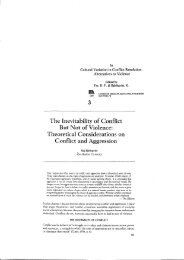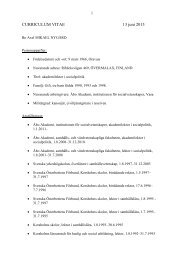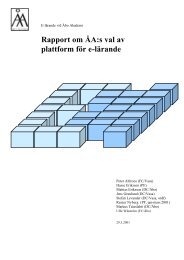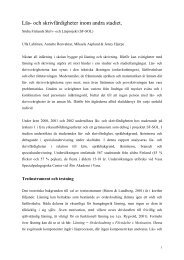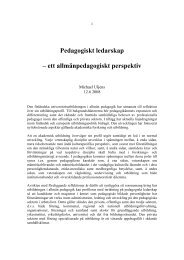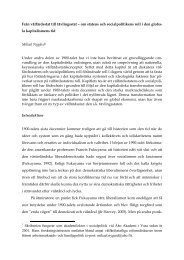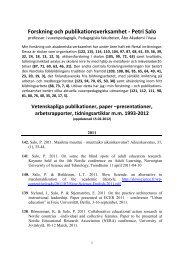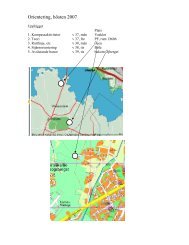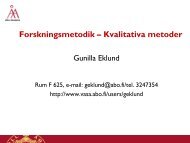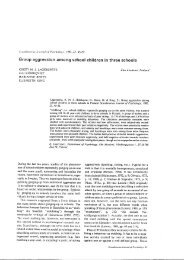Parties, Candidates and Citizens On-Line - Åbo Akademi
Parties, Candidates and Citizens On-Line - Åbo Akademi
Parties, Candidates and Citizens On-Line - Åbo Akademi
Create successful ePaper yourself
Turn your PDF publications into a flip-book with our unique Google optimized e-Paper software.
Some further comments regarding the motivation-based reinforcement argument<br />
merit attention. First <strong>and</strong> foremost, as Djupsund <strong>and</strong> Carlson (2003, 41) observe, the<br />
internet differs from traditional mass media on one essential point: it requires activity<br />
rather than passivity from the user. Whereas television exposes the passive viewer to<br />
political content, the internet user must actively seek out the information he or she desires<br />
from a plethora of choices (cf. Hill & Hughes 1998, 183). This leads to the core argument<br />
of the motivation-based reinforcement theory: “There are a million places to go <strong>and</strong> sites<br />
to see on the Internet. Unless they stumble across political contents accidentally […]<br />
those who choose to visit political sites will probably have far higher than average civic<br />
interest” (Norris 2001b, 221). The internet would merely constitute an alternative channel<br />
for the politically motivated, active <strong>and</strong> engaged to do what they have always done (cf.<br />
Hill & Hughes 1998, 44; Norris 1999, 89). There is little reason to expect the internet to<br />
cause previously uninterested citizens to suddenly become “political animals” (Davis<br />
1999, 8). Even if the technological resources may become evenly distributed both globally<br />
<strong>and</strong> socio-economically in the future, it would not change the preferences of the people<br />
using them.<br />
Several scholars have presented findings which underline the importance of<br />
motivation in determining citizens’ use of the internet. Largely similar socio-economic<br />
patterns to those found concerning traditional political activity <strong>and</strong> interest have been<br />
noted for political internet users (Lusoli 2005a, 262; Norris 1999, 87). Norris (2003, 39)<br />
found that political internet users were both more active users of traditional news sources<br />
as well as more involved <strong>and</strong> interested in traditional politics: “party websites tended to<br />
attract those who were already among the most aware of public affairs, as well as those<br />
with higher socio-economic status” (cf. Norris 2001b, 231). Hill <strong>and</strong> Hughes (1998, 183)<br />
stress that political use of the internet is an act of self-selection: “people go on-line to find<br />
out more information about a subject, not to be transformed”. Stromer-Galley <strong>and</strong><br />
colleagues (Stromer-Galley et al. 2001, 24) note that only a fraction of citizens seek out<br />
political information on the internet, <strong>and</strong> that an even smaller fraction is involved in more<br />
engaging forms of on-line political activity, such as taking part in political discussions (cf.<br />
Cornfield & Rainie 2003, 20; Norris 1999, 81-82; 2001b, 223; 2003, 36). Scheufele <strong>and</strong><br />
Nisbet (2002, 69), in comparing the impact on political efficacy, knowledge <strong>and</strong><br />
participation of both traditional <strong>and</strong> web-based communication, strongly question if the<br />
internet will have any decisive role in promoting a politically active <strong>and</strong> informed<br />
citizenry. Rather, they conclude that traditional newspapers appear to have the greatest<br />
impact.<br />
In sum, a scholarly diversity is evident concerning citizens’ political activity on-line.<br />
In fact, the theories of mobilization <strong>and</strong> reinforcement place essentially different<br />
emphasis on the internet per se in shaping the on-line activity of citizens. The proponents<br />
16



